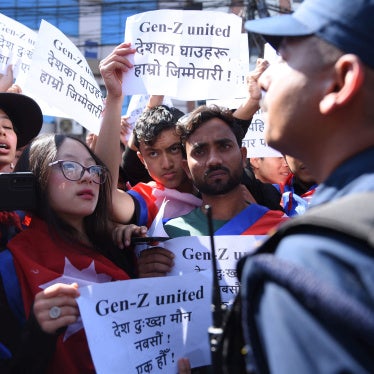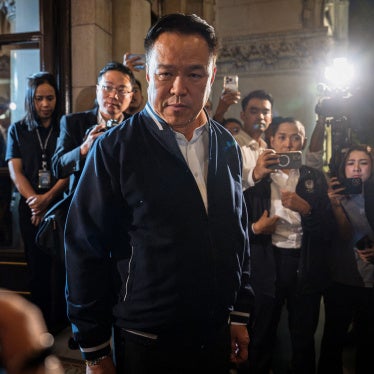Prime Minister Nguyen Tan Dung
Socialist Republic of Vietnam
Dear Prime Minister Nguyen Tan Dung:
We are writing on the occasion of your selection by the National Assembly as prime minister and the formation of a new government in Vietnam. We applaud the pledge you made in your acceptance speech to speed up administrative reform in order to build a state that is governed by law and committed to democracy. We note that there is a great deal to do in these areas, but if the commitments are followed up with action they would mark a clear change of course and provide an important opportunity for Vietnam to firmly demonstrate its respect for its international human rights obligations.
Recent years have seen a progressive opening up of Vietnam to the international community and a quickening pace of economic and social change. Vietnam’s economy stands out in Asia for having one of the highest growth rates. Your country has also made important strides, as reflected by UNDP indicators, in the areas of income, health, education, and poverty alleviation.
Where Vietnam seriously lags behind many other countries, however, is in respect for fundamental human rights and openness to political pluralism. Economic development, good governance, and respect for human rights are inextricably linked. Your leadership during the coming years on these issues, when Vietnam seeks to more fully participate in the global economy and be a respected member of the international community, will be crucial.
We urge you to seize this opportunity by launching legislative and policy reforms—backed up by concrete action—that firmly establish respect for human rights as a central feature of your administration. Vietnam now has an opportunity to affirm its commitment to human rights and its treaty obligations under the International Covenant on Civil and Political Rights (ICCPR), to which Vietnam is a state party, and its 1992 Constitution, which states in Article 69 and 70:
The citizen shall enjoy freedom of opinion and speech, freedom of the press, the right to be informed, and the right to assemble, form associations and hold demonstrations in accordance with the provisions of the law.
We have outlined key areas below, which we respectfully request that your government set as priorities in order to improve its promotion and protection of human rights.
1. Controls over Freedom of Expression and the Internet
As you know, Article 19 of the ICCPR provides for the right to freedom of expression. In contrast, Vietnam’s Law on Publications strictly bans publications that oppose the government, divulge state secrets, or disseminate reactionary ideas. According to Vietnam’s Press Law, the role of the media is to serve as the voice of the party and state. There are no privately-owned media outlets; all publications are published by the government, the Party, or Party-controlled organizations.
In addition, the government controls the Internet by blocking websites considered objectionable or politically sensitive, monitoring email and on-line forums, and making Internet café owners responsible for information accessed and transferred on the Internet by their customers.
Strict new regulations and penalties have been introduced. Decree No. 56/2006/ND-CP defines 2,200 violations of the law in the area of culture and information. Effective July 1, this decree calls for fines of up to 30 million dong (US $2,000) for circulating “harmful” information by any means and violating culture and information rules, such as denying revolutionary achievements, defaming the nation and national heroes, publishing stories with anonymous sources, or revealing “party secrets, state secrets, military secrets and economic secrets.” It requires journalists to clear interviews with sources before publication, effectively allowing for pre-press censorship. It also stiffens government controls over the Internet, such as imposing fines on Internet café owners who allow customers to access “harmful” material.
Several Internet users have been imprisoned for alleged national security crimes after using the Internet to disseminate views disfavored by the government or participating in pro-democracy discussion forums. They include Pham Hong Son, Nguyen Vu Binh, Truong Quoc Tuan, Truong Quoc Huy and Lisa Pham.
We urge your government to:
- Amend provisions of Vietnam’s Criminal Code that restrict and criminalize the right to peaceful dissent, particularly the provisions on national security. Bring press laws into compliance with Article 19 of the ICCPR.
- Remove restrictions on Internet usage and release people imprisoned for peaceful dissemination of their views over the Internet.
2. Restrictions on Freedom of Association and Assembly
Article 21 of the ICCPR recognizes the right of peaceful assembly, and Article 22 provides for the right to freedom of association with others. In Vietnam, however, political parties, unions, and nongovernmental human rights organizations that are independent of the government, the Party or mass organizations controlled by the Party are not allowed to operate. Public demonstrations are extremely rare, especially after government crackdowns against mass protests in the Central Highlands in 2001 and 2004. Decree 38/1005/ND-CP, signed by the prime minister in March 2005, stiffens restrictions on freedom of assembly. It bans public gatherings in front of places where government, party, and international conferences are held, and requires organizers of public gatherings to apply for and obtain government permission in advance.
We urge your government to:
- Permit individuals the right to associate freely and peacefully with others of similar views regardless of whether those views run counter to the political or ideological views approved by the Party and state.
- Bring legislation regulating public gatherings and demonstrations into conformity with the ICCPR.
3. Freedom of Religion
The Vietnamese government has made some important strides recently by issuing new directives on religion that expedite church registration requirements and forbid official coercion to convert, as well as forced recantations of faith. The 2004 Ordinance on Beliefs and Religions affirms the right to freedom of religion, as provided for in Article 18 of the ICCPR. However, it requires that all religious groups register with the government in order to be legal, and bans any religious activity deemed to cause public disorder, harm national security and national unity, or “sow divisions.”
Followers of religions that are not officially recognized by the government continue to be persecuted. Security officials disperse their religious gatherings, confiscate religious literature, and summon religious leaders to police stations for interrogation. Buddhist monks from the banned Unified Buddhist Church of Vietnam, including its Supreme Patriarch, Thich Huyen Quang, and second-ranking leader, Thich Quang Do, have been confined without charges to their monasteries for years, under police surveillance. Officials continue to force individuals to recant their beliefs despite a 2005 decree banning such practices.
We urge your government to:
- End the restrictions on gatherings of religious groups that are not registered with the government, release Buddhist monks who have been placed under house arrest, abolish the practice of forced recantations of faith and pressure to affiliate with officially registered religious organizations, and bring an end to abusive police surveillance and harassment of religious leaders and followers.
- Invite the U.N. Special Rapporteur on Religious Intolerance, who visited Vietnam in 1998, for a follow-up visit to Vietnam.
4. Arbitrary Arrest, Torture, and Unfair Trials
Article 14 of the ICCPR states that no one shall be subjected to arbitrary arrest or detention. Anyone arrested or detained on a criminal charge shall be brought promptly before a judicial officer and is entitled to trial within a reasonable time or to release.
Hundreds of religious and political prisoners remain behind bars in prisons throughout Vietnam, including in Ha Nam, Dong Nai, Phu Yen, Nghe An / Ha Tinh, and Thanh Hoa provinces. There is compelling evidence of torture and other mistreatment of detainees. Prison conditions are extremely harsh and fall far short of international standards. We have received reports of solitary confinement of detainees in cramped, dark, unsanitary cells; and of police beating, kicking, and using electric shock batons on detainees, or allowing inmates or prison gangs to carry out beatings of fellow prisoners with impunity.
Police officers routinely arrest and detain suspects without written warrants. The judicial system is vulnerable to government or party interference and pressure. Trials of dissidents are closed to the public, the media, and often to the families of the detainees themselves. Defendants often do not have access to independent legal counsel. Under Administrative Detention Decree 31/CP, individuals can be put under house arrest for alleged national security crimes for up to two years without going before a judge.
We urge your government to:
- Release all persons in Vietnam who are being held for the peaceful expression of their political or religious beliefs.
- Publish a central, public registry of the names and locations of all people held in pretrial detention, as well as any charges against them, and the names, charges, sentences, and locations of those who have been convicted and sentenced.
- Repeal the 1997 Administrative Detention Directive 31/CP, which authorizes detention without trial for up to two years for individuals deemed to have violated national security laws.
- Make a public commitment to end the practice of torture. Appoint a special commission to investigate allegations of torture in the Central Highlands and to recommend appropriate prosecutions and discipline of any persons found responsible.
- Extend a standing invitation to the U.N. Working Group on Arbitrary Detention, which visited Vietnam in 1994, and the Special Rapporteur on Torture to visit Vietnam, with unrestricted access to the Central Highlands.
- Conduct penal, legal, and court proceedings with greater transparency and accountability. Publicly announce trials and charges in advance of trial proceedings. Guarantee that trials are held in accordance with international fair trial standards set forth in Article 14 of ICCPR. The trials should be public and open to Vietnamese citizens, international observers, and independent monitors. Those accused should have access to legal counsel of their choosing and the free assistance of an interpreter where necessary, as mandated by both the ICCPR and Vietnam’s Constitution.
As a party to the International Covenant on Civil and Political Rights, Vietnam is committed to protect basic rights and freedoms. You have already voiced your commitment to reform. Now, as a measure of respect for your people, we ask that you demonstrate this commitment by making every effort to uphold and improve Vietnam’s important international human rights obligations.
We look forward to discussing these and other human rights matters with you and your government in the coming years.
Sincerely,
Brad Adams
Executive Director
Asia Division








